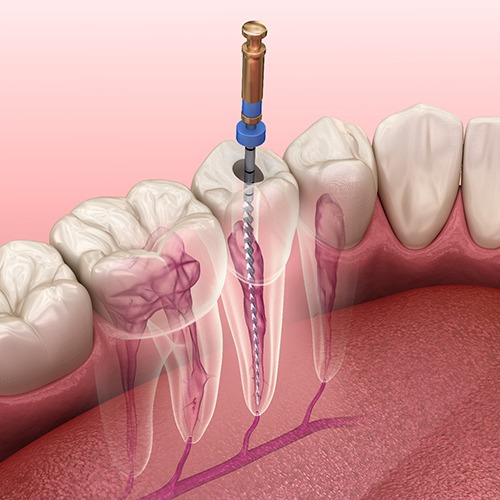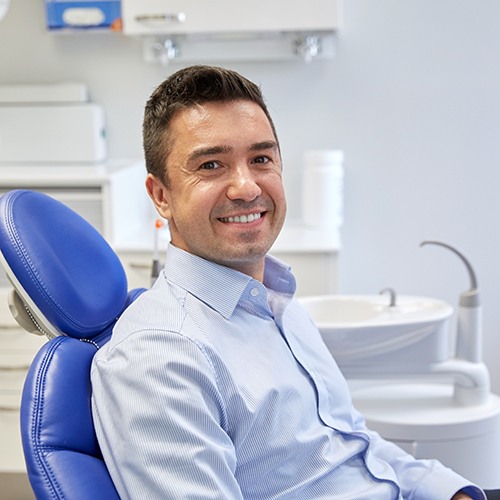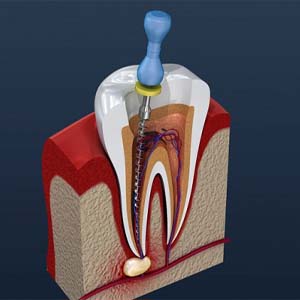

While not all tooth pain is serious, you should still make note of any you have. Your harsh toothache may stem from an infection of the dental pulp – the nerves in your tooth’s center. In that case, you’ll want to see Dr. Hoop for a root canal treatment here. He and the rest of our team will ease your pain, keep your tooth safe, and more! As for the details, please keep reading or book a consultation with us.
Dr. Hoop understands patients can be nervous about dental procedures like root canals. Still, the treatment is predictable — about 95 percent of root canals are successful. During care, Dr. Hoop makes a small hole in the tooth, removes the infection, and then fills your tooth with a material called gutta-percha. Most teeth will need dental crowns following the procedure to strengthen the enamel.
Our patients find it easy to remain comfortable during root canal treatment because of:
It’s crucial to manage dental issues before they cause more damage. Root canal infections can spread to nearby healthy teeth – and even elsewhere in the body – so patients need to address the problem as soon as possible.

A root canal treats an infected or abscessed tooth, so you’ll need one if you show signs of the latter. That means you should watch out for the following symptoms:
Please reach out to us if you show the signs above; we’ll quickly get you an appointment.

Though it isn’t painful, a root canal is involved and invasive. It requires Dr. Hoop to follow a multi-step treatment process.
The procedure starts by numbing your mouth with anesthesia. That way, you won’t feel pain or discomfort from the later parts of treatment. You’ll only sense mild pressure at most.
Dr. Hoop will perform the actual root canal once the treatment site is numb. At that point, he’ll use dental tools to reach your tooth’s inner chamber. He’ll then remove this area’s pulp, sanitize the now-emptied interior, and refill it with gutta-percha – a synthetic material that acts as a filling. After these steps, Dr. Hoop will conclude by sealing your tooth and protecting it with a temporary crown.
You should receive a permanent crown a few weeks after your treatment. Once it’s placed, you can trust it to protect your tooth. You’ll then be ready to enjoy your pain-free smile!

Rest assured that a root canal has many great benefits, including perks like:

We understand that cost is a major factor in a patient’s decision to go through with any dental treatment, and root canal therapy is no exception. That said, root canal cost can vary based on a few factors. Therefore, we can’t give you an accurate estimate until Dr. Hoop has examined your mouth. At that point, we can review your financing options, including dental insurance and our in-house savings plan. Rest assured that although root canal therapy may seem expensive at first, this procedure can actually save you money in the long run by preserving your natural tooth and improving your oral health.

The main variable that influences the cost of root canals is which specific tooth needs treatment. The teeth toward the back of the mouth, known as molars, contain more roots than the teeth in the front of your mouth do. As a result, root canals on molars require more care and take more time, resulting in them generally having a higher price tag. In many cases, you can expect a root canal on a molar to cost between $500 and $2,000, while a root canal on a front tooth will cost somewhere in the range of $300 to $1,000.
Another factor that affects root canal cost is whether you require any additional procedures. It’s common for a tooth that is treated with root canal therapy to need a filling or dental crown afterward to protect the tooth from further damage. While fillings usually only cost a few hundred dollars, a crown may add another $1,400 to $1,600 to your total treatment costs.
Of course, these numbers are all just estimates, so take them with a grain of salt. Our team members will provide you with more precise numbers during your appointment.

Because tooth extractions tend to cost less than root canals, you might be tempted to save money by just having the tooth removed instead. However, losing a natural tooth leads to long-term consequences. For example, your remaining teeth may drift out of alignment, which can negatively affect your bite. You may have difficulty eating and experience chronic discomfort.
Preventing these problems requires the tooth to be replaced with a dental implant or bridge, both of which cost money (often more than what a root canal would cost). Ultimately, it’s more cost-effective to save your natural tooth now rather than spend more money replacing it later. Also, don’t wait to get a root canal when you need one – delaying the treatment increases the likelihood that the damage will worsen and we’ll have to extract the tooth anyway.

Since root canal therapy is considered a major procedure, dental insurance plans are likely to cover around 50% to 80% of the cost (after you’ve paid your deductible and before you’ve met your annual maximum). However, every plan differs, so it’s essential to confirm your level of coverage with your insurance provider first. Don’t worry – our team can help with this process to ensure you get the most out of your benefits.

In addition to dental insurance and traditional payment methods, we have other ways of helping you afford a root canal, including:
Has a persistent toothache been bothering you? Reach out to our team to find out whether root canal therapy is just what you need to save your smile. We’ll help you get the gentle care you need without breaking the bank!
Typically, yes! Good oral hygiene habits, like brushing twice a day and getting a checkup and cleaning twice a year, can go a long way in preventing decay and infections. That’s why we encourage our patients to prioritize preventive care and abide by other best practices, such as not consuming sugar in excess and not using tobacco products.
The short answer is that the longer you wait, the more time the infection has to spread. For that reason, we strongly recommend getting a root canal when you first realize it’s necessary. Otherwise, your surrounding teeth and gums can quickly become damaged as well. Furthermore, several studies have shown that the bacteria in your mouth can spread to your vital organs via your bloodstream, meaning that poor oral health can result in poor overall health.
Thankfully, the answer is no! That’s because whether we are treating one tooth or multiple teeth, the first step of the procedure is always thoroughly numbing your mouth. Plus, if you struggle with dental-related anxiety, dental sensitivity, or a strong gag reflex, we can also use sedation dentistry. This will ensure that you stay completely calm and comfortable from start to finish.
Note: Following your root canal procedure, it is normal to experience some soreness. To help minimize this sensation, you should take an OTC pain reliever, keep your mouth clean, and stick to soft foods for the first few days.
Although recovery differs depending on a few factors, including how many teeth were treated, patients can typically resume their usual day-to-day activities the following day. Of course, if your job is physically demanding, then you may want to take a bit more time off to allow yourself to fully recover. After about three days, you should feel back to normal.
If you are being sedated for your procedure, then we may ask that you fast the morning of. Outside of that, however, you can eat before your root canal. We recommend opting for something healthy and filling, like oatmeal. It may go without saying, but you should also avoid drinking alcohol before your appointment.
Although pain is one of the most common symptoms of a severely damaged tooth, there are other signs that root canal therapy is needed. A few examples include dark pigmentation on the tooth, a pimple-like bump on your gums, and red, inflamed, or irritated gums.
Let Dr. Hoop examine your mouth and put you on the path to a healthier smile. Give us a call today for more information on root canals.